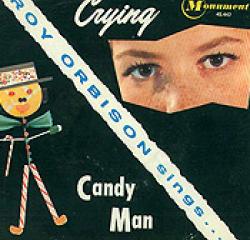
"Crying" is a song written by Roy Orbison and Joe Melson for Orbison's third studio album of the same name (1962). Released in 1961, it was a number 2 hit in the US for Orbison and was covered in 1978 by Don McLean, whose version went to number 1 in the UK in 1980.

"9 to 5" (or "Morning Train") is a song by Sheena Easton from 1981 album Take My Time. It was written by British songwriter Florrie Palmer and recorded and released as single in 1980, becoming Easton's biggest hit. It peaked at number three in the United Kingdom in August 1980 and was certified gold. In February 1981, it was released in the United States and Canada under the title "Morning Train (Nine to Five)" to avoid confusion with Dolly Parton's recent hit "9 to 5". It reached number one in both countries, becoming Easton's only chart-topper in those nations.
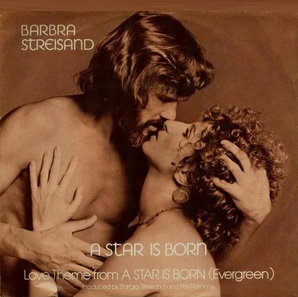
"Evergreen" is the theme song from the 1976 film A Star Is Born. It was composed and performed by American singer, songwriter, actress and director Barbra Streisand with lyrics by Paul Williams, and arranged by Ian Freebairn-Smith. The song was released on the soundtrack album to A Star Is Born.

"Someone Saved My Life Tonight" is a song, with music by English musician Elton John and lyrics by Bernie Taupin, from John's 1975 album Captain Fantastic and the Brown Dirt Cowboy. It was released as a single on 23 June 1975, the only single released from the album. Like the rest of the album, the song is autobiographical, and addresses an attempted suicide by John.

"Woman in Love" is a song performed by Barbra Streisand and taken from her 1980 album Guilty. The song was written by Barry and Robin Gibb of the Bee Gees, who received the 1980 Ivor Novello award for Best Song Musically and Lyrically. It is her fourth of four Platinum records, and is considered her greatest international hit.

"Too Much, Too Little, Too Late" is a song performed by singers Johnny Mathis and Deniece Williams. Lyrics and music were arranged by Nat Kipner and John Vallins. The single was a comeback of sorts for Mathis as his last U.S. top 10 hit was 1963’s "What Will Mary Say" and his last U.S. #1 hit was 1957's "Chances Are."

"Don't Give Up on Us" is a hit song recorded by American-British singer David Soul, and written by Tony Macaulay.
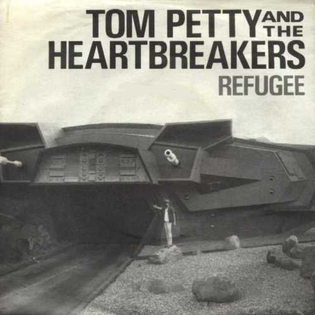
"Refugee" is a song recorded by American rock band Tom Petty and the Heartbreakers. It was released in January 1980 as the second single from their album Damn the Torpedoes, and peaking at No. 15 on the Billboard Hot 100 singles chart. The song is in compound AABA form.

"Undercover Angel" is a song by singer-songwriter Alan O'Day. Released as a single in 1977, it was certified gold, having reached No. 1 on the Billboard Hot 100 and No. 9 on the Australian Singles Chart.

"Reunited" is a hit song for R&B vocal duo Peaches & Herb. As the second single release from their album, 2 Hot (1978), the song was a huge crossover smash, topping both the pop and soul charts. It spent four weeks at number one on both the R&B singles chart and the Billboard Hot 100 singles chart in 1979 and sold over two million copies. Billboard ranked it as the No. 5 song for 1979. In Canada, "Reunited" likewise reached number one and was the No. 9 song for the year.

"Turn Your Love Around" is a pop/R&B single by George Benson. The song was written by Grammy winners Bill Champlin of Chicago, Steve Lukather of Toto and producer and guitarist Jay Graydon to help fill out Benson's 1981 greatest hits album, The George Benson Collection. The song won a Best R&B Song Grammy Award at the 25th Grammy Awards in 1983 for Champlin, Graydon, and Lukather as its co-writers.

"Only Yesterday" is a song recorded by the Carpenters. Released on March 14, 1975, the song was composed by Richard Carpenter and John Bettis. "Only Yesterday" peaked at number four on the Billboard Hot 100 and number one on the Adult Contemporary (AC) charts, The Carpenters' eleventh number one on that chart.
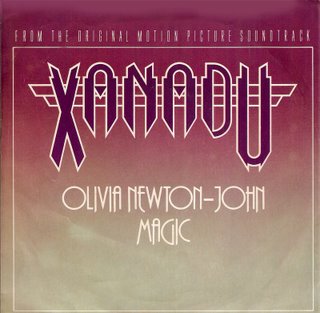
"Magic" is a song recorded by British-Australian singer Olivia Newton-John for the soundtrack to the 1980 musical fantasy film Xanadu. Written and produced by John Farrar, the song was released as the lead single from the album in May 1980 and topped the US Billboard Hot 100 for four weeks beginning on August 2. On August 30, it was displaced from the top by Christopher Cross's "Sailing".

"Lonely Night (Angel Face)" is a song written by Neil Sedaka. The song was first recorded by Sedaka and appeared as a track on his 1975 studio album, The Hungry Years. The following year the song was made popular when covered by the pop music duo Captain & Tennille, who took their version to number 3 on the Billboard Hot 100.
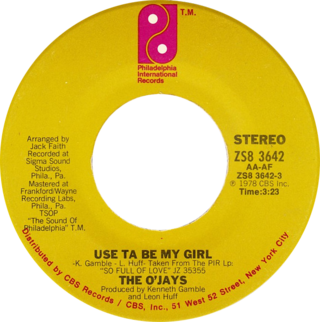
"Use ta Be My Girl" is a song by R&B vocal group The O'Jays. Released from their hit 1978 album, So Full of Love, it became a crossover hit. The song spent five weeks at number one on the R&B singles chart. It also peaked at number four on the Billboard Hot 100 singles chart. "Use ta Be My Girl" became one of the biggest and most familiar hits by The O'Jays. The song has also been certified by the RIAA as a million-seller.

"Fooled Around and Fell in Love" is a song written and performed by blues guitarist Elvin Bishop with Mickey Thomas on lead vocals. It appeared on his 1975 album Struttin' My Stuff, and was released as a single the following year.
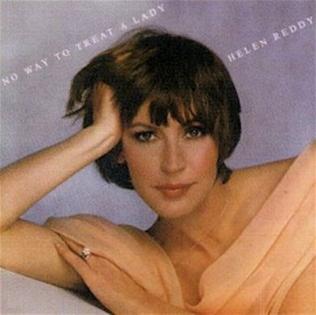
"Ain't No Way to Treat a Lady" is a 1974 written and first recorded by American singer-songwriter Harriet Schock. It was covered by various other artists, and saw its greatest success when it was covered by Helen Reddy, whose 1975 rendition became a top 10 hit.

"Sexy Eyes" is a song by Dr. Hook, released as a single in early 1980. It was the second of three singles from their LP Sometimes You Win.
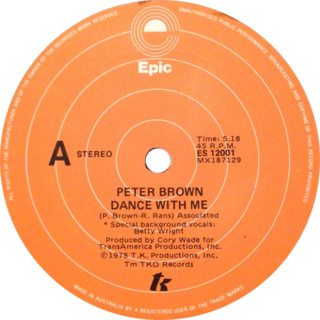
"Dance With Me" is a 1978 international hit single recorded by Peter Brown. It was the second release from his first LP, and became his greatest hit. Backing vocals were provided by Betty Wright along with her girlfriends Patricia Hurley and Wildflower.
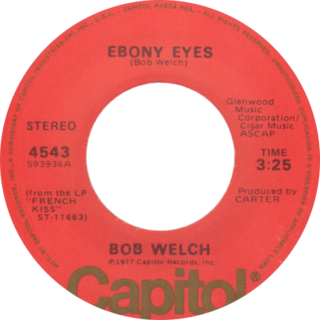
"Ebony Eyes" is a song written and performed by Bob Welch. The song was the second single release and second hit song from his album French Kiss. Backing vocals are provided by Juice Newton.



















